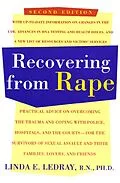From clinical psychologist Linda E. Ledray, Recovering from Rape is a comprehensive handbook offering emotional support and practical guidance to survivors and their loved ones in coping and overcoming the trauma of rape. If you have been sexually assaulted, you are probably experiencing a mix of fear, anger, and depression. If you are a relative, friend, or lover of someone who has been assaulted, you too may be deeply affected by the incident and by the survivor's reaction to it. However, working together, survivors and their loved ones can recover and may even be able to turn the recovery into an opportunity for positive change and growth. The experiences of survivors recounted throughout this book reassure readers that others have pulled through. Dr. Ledray helps survivors realize that no matter what they did-wore a low-cut blouse, accepted a ride from a stranger, invited an acquaintance home-they did not deserve to be raped. She guides them from guilt or disbelief through bitterness and despair to the decision to take back control of their lives. In addition, this comprehensive handbook explains what to expect at the police station, at the hospital, and, if necessary, in court. It covers such health issues as incest, STD treatments, and post-traumatic stress disorder, and legal information on prosecution and bail, DNA testing, and rape law. An essential resource, Recovering from Rape helps readers learn the most effective ways of dealing with their feelings immediately following an assault, during the subsequent few months, and beyond.
Autorentext
Linda E. Ledray holds a Ph.D. in clinical psychology and personality research and is a registered nurse. A licensed psychologist and fellow of the American Academy of Nursing, she is the founder and director of the Minneapolis Sexual Assault Resource Service and has been working with rape survivors for twenty years. She lives in Mound, Minnesota.
Inhalt
Introduction: What is Rape, and What Can We Do About It?
I. It's Not Your Fault
To the Survivor: The Function of Rape Myths * Different Kinds of Rape
To the Significant Other: Don't Blame Her * Don't Blame Yourself * What If She Blames You? * Why Blame Yourself or the Survivor?
2. Your Next Move Can Make a Difference
To the Survivor: Dealing with the Police * Getting Medical Attention * Your Safety and Security * Rape Crisis Centers
To the Significant Other: Don't Take the Law into Your Own Hands * Contacting the Police * Medical Concerns for You and Her * Rape Crisis Centers and You
3. Sorting Out Your Feelings and Response
To the Survivor: Shock and Disbelief * Confusion, Fear, Depress, and Anger * Post-Traumatic Stress Disorder * Sexual Dysfunction and Promiscuity * Factors Affecting Your Response
To the Significant Other: Understanding Your Initial Response * How You Can Help
4. Your Recovery: Taking Back Control
To the Survivor: Evaluating Your Resources * Coping with Fear, Anger, and Depression * Rebuilding Your Self-Esteem * Learning to Enjoy Sex Again * Getting Help or Going It Alone
To the Significant Other: Should She Be Over It By Now? * What You Can Do to Help * Dealing with Her Anger * Avoiding Burnout * Being There When the Others Have Gone * What If You Can't Talk About It?
5. Telling Other People
To the Survivor: The Fears of Telling * Whom to Tell * When to Tell * How to Tell
To the Significant Other: What If She Didn't Tell You? * What Will Other People Think? * Conditions That Encourage Openness
6. The First Anniversary and Beyond
To the Survivor: As the Anniversary Approaches * When You Are Not "Over It" * When You Have Essentially Recovered * Survivors Who Don't Remember the Anniversary * Things that Facilitate or Delay Recovery * Years to Come * Changes for the Better
To the Significant Other: Your Anniversary Concerns * Is She Really "Over It"? * What If She Won't Get Help?
7. Overcoming the Trauma of a Childhood Sexual Assault
To the Survivor: What If You Just Remembered? * What If You've Been Labeled "Crazy"?
To the Significant Other: Clues to the Sexual Abuse of Children * What to Do If you Suspect Sexual Abuse * Helping the Child * Remember, It's Not Your Fault * How Can You Keep Your Child Safe?
8. Prosecuting and Convicting the Rapist
To the Survivor: The Problems of Prosecuting * A Successful Case in Review * Survivor Attributes That May Affect Your Case * Offender Attributes That May Affect Your Case * Circumstances of the Assault * Rape Laws * The Police Investigation * The Court System
To the Significant Other: Helping Her Through the Legal System * What If you Know the Assailant?
9. Who Rapes?
Biological Explanations of Rape * The Role of Sex and Aggression * The Role of Pornography * Motives for Rape * Profiles of Rapists * Men Who Are Raped
10. Preventing Rape
Protecting Yourself * Resisting Rape * Community Preventative Strategies * Sociocultural Preventative Strategies
Rape Crisis Centers in the United States
Suggested Readings
